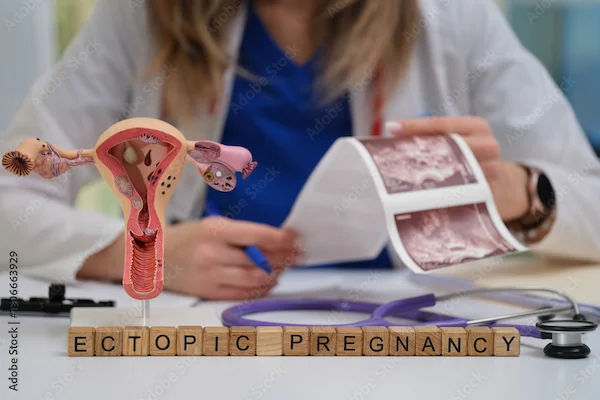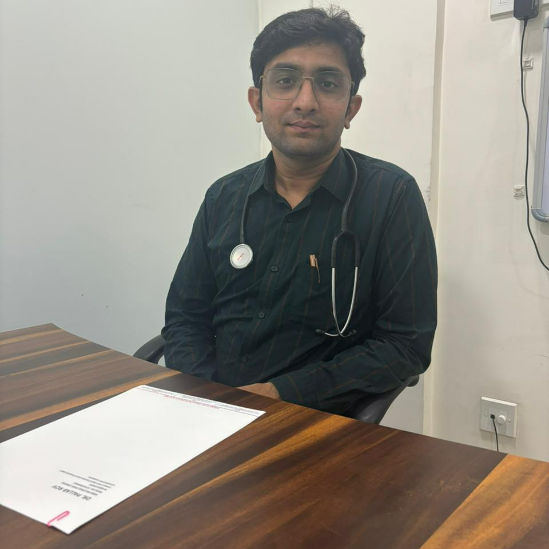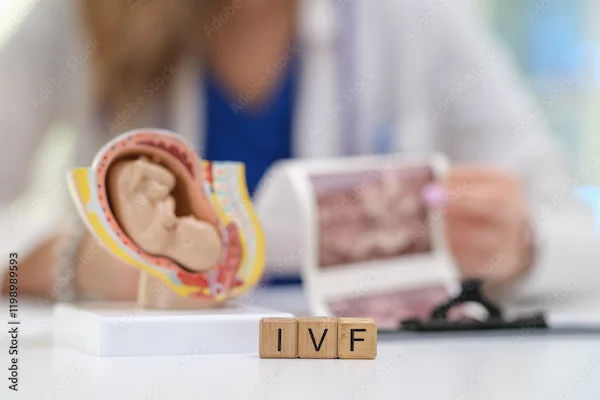Understanding Ectopic Pregnancy: An Essential Guide for Expectant Mothers
Learn about ectopic pregnancy, its causes, symptoms, risks, and treatment options. Get the essential knowledge to recognize early signs and seek timely care.

Written by Dr. Sonia Bhatt
Last updated on 3rd Jul, 2025

Introduction
Pregnancy is an exciting and often life-changing journey, but it also comes with a range of possibilities and risks. One such complication, though rare, is an ectopic pregnancy. While the term might sound unfamiliar or alarming, understanding ectopic pregnancy can empower you to make informed decisions about your health.
What Is an Ectopic Pregnancy?
An ectopic pregnancy occurs when a fertilised egg implants and grows outside of the uterus, most commonly in one of the fallopian tubes, though it can occasionally occur in the ovaries, abdomen, or cervix. The fallopian tubes are the typical site because they are the path that the egg travels down to reach the uterus after fertilisation. When the egg implants in an abnormal location, the pregnancy cannot develop properly, and this situation can be life-threatening if not managed appropriately.
Normally, the fertilised egg will implant in the uterus, where it can grow into a healthy baby. However, in the case of an ectopic pregnancy, the fertilised egg is unable to develop properly and may cause complications in the surrounding tissues. It is important to note that ectopic pregnancies are not viable, and the embryo cannot survive.
What are the Causes of Ectopic Pregnancy?
There are several causes and contributing factors behind an ectopic pregnancy. Some common causes include:
Fallopian tube damage or scarring: The most common cause of an ectopic pregnancy is damage to the fallopian tubes, often from an infection such as pelvic inflammatory disease (PID) caused by sexually transmitted infections (STIs) like chlamydia or gonorrhoea. Surgery or endometriosis can also lead to scarring that affects the egg's movement.
Previous ectopic pregnancy: If you’ve had an ectopic pregnancy before, you are at an increased risk of having another one. This is because the underlying issues that led to the first ectopic pregnancy may still be present.
Contraceptive use: Although rare, using intrauterine devices (IUDs) or having had tubal ligation (a surgical procedure for permanent birth control) can increase the chances of an ectopic pregnancy, especially if the contraception fails.
Age and fertility treatments: Women over the age of 35 may experience a higher risk of an ectopic pregnancy. Additionally, assisted reproductive technologies such as in vitro fertilisation (IVF) may increase the risk of ectopic pregnancies.
Smoking: Smoking has been associated with an increased risk of ectopic pregnancies, as it can affect the movement of the fertilised egg through the fallopian tube.
Symptoms of Ectopic Pregnancy
It is essential to recognise the signs and symptoms of an ectopic pregnancy early on, as the condition can be dangerous if left untreated. Many of the symptoms of ectopic pregnancy are similar to the typical pregnancy. This makes diagnosis of ectopic pregnancy more difficult. However, there are some key symptoms to watch out for, which include:
Pelvic or abdominal pain is often the first sign. It may start as mild cramping and become more severe. The pain may be on one side of the lower abdomen and can intensify over time.
Vaginal bleeding: Light bleeding or spotting may occur. This bleeding is often darker in colour and may be different from your regular period.
Shoulder tip pain: If the ectopic pregnancy causes internal bleeding, you might feel sharp pain in the shoulder area. This occurs due to blood irritating the diaphragm.
Fainting or dizziness: If the fallopian tube ruptures, it can lead to severe internal bleeding. This may cause fainting, dizziness, or feeling lightheaded, which requires immediate medical attention.
Pain during urination or bowel movements: This may occur if the ectopic pregnancy is pressing on nearby organs.
If you experience any of these symptoms, seeking medical help is crucial. A delay in treatment can lead to serious complications such as rupture, internal bleeding, or even shock.
Risk Factors for Ectopic Pregnancy
Certain factors may increase your likelihood of experiencing an ectopic pregnancy. These include:
History of pelvic infections or STIs: Infections that cause damage to the reproductive organs, such as pelvic inflammatory disease (PID), can increase the risk.
Endometriosis: This condition, where tissue similar to the uterine lining grows outside the uterus, can affect the fallopian tubes and other reproductive organs, leading to a higher risk of ectopic pregnancy.
Previous tubal surgery or sterilisation: Any surgery involving the fallopian tubes, such as tubal ligation or tubal surgery, increases the risk of ectopic pregnancy.
Increased age: Women aged 35 or older may be more likely to experience ectopic pregnancies due to changes in the fallopian tubes and overall reproductive health.
Fertility treatments: Assisted reproductive technologies, including IVF, can result in an ectopic pregnancy in rare cases.
How Is Ectopic Pregnancy Diagnosed?
If an ectopic pregnancy is suspected, your doctor will typically perform a series of tests, including:
Pelvic examination: Your doctor may perform a physical exam to check for tenderness in the abdomen and pelvic region.
Ultrasound: A transvaginal ultrasound can help detect whether the pregnancy is located in the uterus or elsewhere and whether there are any signs of internal bleeding.
Blood tests: The levels of the pregnancy hormone hCG (human chorionic gonadotropin) can be measured. In a healthy pregnancy, hCG levels rise consistently, but in an ectopic pregnancy, they may rise more slowly or plateau.
Treatment of Ectopic Pregnancy
Treatment for an ectopic pregnancy depends on several factors, including the size of the ectopic pregnancy, the location, and the patient's overall health. Treatment options may include:
Medication (Methotrexate): In cases where the pregnancy is diagnosed early and does not cause significant damage or internal bleeding, a medication called methotrexate may be used to stop the growth of the pregnancy and allow the body to absorb it.
Surgery: If the ectopic pregnancy is causing significant damage or is at risk of rupturing, surgery may be required. If detected early, the surgeon can remove the pregnancy while leaving the tube intact, whereas if detected late,, the affected fallopian tube might be removed too.
Laparoscopy: This is a minimally invasive surgical procedure which involves making small incisions and using a camera to remove the pregnancy from the fallopian tube.
It’s important to note that, in any case, the goal of treatment is to protect the health and safety of the patient and prevent complications like internal bleeding, which can be life-threatening.
Coping with an Ectopic Pregnancy
Experiencing an ectopic pregnancy can be emotionally challenging. It may feel like a loss, especially if you are excited about your pregnancy. Here are a few tips for coping:
Seek emotional support: Talking to your partner, a close friend, or a professional counsellor can help you navigate your emotions during this time.
Give yourself time to heal: Physically and emotionally, it’s essential to allow yourself time to recover. Be kind to yourself, and don’t rush back into normal routines until you feel ready.
Consider future pregnancies: If you have had an ectopic pregnancy, it’s important to follow up with your doctor to discuss future fertility and your risk of another ectopic pregnancy.
Conclusion
While an ectopic pregnancy can be a frightening and overwhelming experience, understanding the condition can help you navigate it with confidence. Early recognition of symptoms, timely medical intervention, and proper emotional support are key factors in ensuring the best outcome. If you have any concerns or risk factors, be sure to speak with your healthcare provider to develop a plan that keeps you safe and informed. Remember, an ectopic pregnancy is a rare occurrence, and with proper medical care, you can minimise the risks and continue your journey towards a healthy pregnancy in the future.
Consult Top Obstetrician-Gynecologists
Consult Top Obstetrician-Gynecologists

Dr. Alapati Jyotsna
Obstetrician and Gynaecologist
4 Years • MBBS MS Obstetrics and Gynaecology
Visakhapatnam
Apollo 24|7 Clinic - Andhra Pradesh, Visakhapatnam

Dr. Priyanka Surisetty
Obstetrician and Gynaecologist
8 Years • MBBS, DGO
Visakhapatnam
Apollo 24|7 Clinic - Andhra Pradesh, Visakhapatnam
(150+ Patients)

Dr Swatika Kumari
Obstetrician and Gynaecologist
19 Years • MBBS, DGO, DNB Obstetrics & Gynaecology
Nashik
Apollo 24|7 Clinic - Maharashtra, Nashik

Dr. Rituparna De
Obstetrician and Gynaecologist
6 Years • MBBS, MS (Obstetrics & Gynaecology)
Kolkata
MCR SUPER SPECIALITY POLY CLINIC & PATHOLOGY, Kolkata

Dr. Pallab Roy
Obstetrician and Gynaecologist
6 Years • MBBS, MS Obstetrics & Gynecology
Kolkata
Dr Pallab Roy, Kolkata
(25+ Patients)



